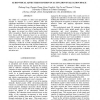Free Online Productivity Tools
i2Speak
i2Symbol
i2OCR
iTex2Img
iWeb2Print
iWeb2Shot
i2Type
iPdf2Split
iPdf2Merge
i2Bopomofo
i2Arabic
i2Style
i2Image
i2PDF
iLatex2Rtf
Sci2ools
115
click to vote
ICMCS
2005
IEEE
2005
IEEE
Audio-visual affect recognition in activation-evaluation space
The ability of a computer to detect and appropriately respond to changes in a user’s affective state has significant implications to Human-Computer Interaction (HCI). To more accurately simulate the human ability to assess affects through multi-sensory data, automatic affect recognition should also make use of multimodal data. In this paper, we present our efforts toward audio-visual affect recognition. Based on psychological research, we have chosen affect categories based on an activationevaluation space which is robust in capturing significant aspects of emotion. We apply the Fisher boosting learning algorithm which can build a strong classifier by combining a small set of weak classification functions. Our experimental results show with 30 Fisher features, the testing error rates of our bimodal affect recognition is about 16% on the evaluation axis and 13% on the activation axis.
| Added | 24 Jun 2010 |
| Updated | 24 Jun 2010 |
| Type | Conference |
| Year | 2005 |
| Where | ICMCS |
| Authors | Zhihong Zeng, ZhenQiu Zhang, Brian Pianfetti, Jilin Tu, Thomas S. Huang |
Comments (0)

